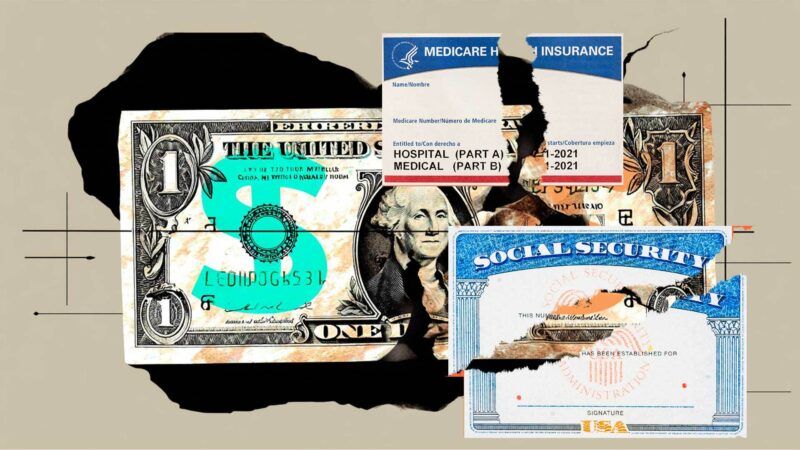Social Security and Medicare Are Racing Toward Drastic Cuts—Yet Lawmakers Refuse To Act
Other countries have taken meaningful steps to address similar challenges. The U.S. has done nothing.

Considering recent news, you may have missed that the 2025 trustees reports for Social Security and Medicare are out. Once again, they confirm what we've known for decades: Both programs are barreling straight toward insolvency. The Social Security retirement trust fund and Medicare Hospital Insurance trust fund are each on pace to run dry by 2033.
When that happens, seniors will face an automatic 23 percent cut in their Social Security benefits. Medicare will reduce payments to hospitals by 11 percent. These cuts are not theoretical. They're baked into the law. If nothing changes, they will be made.
I have nothing against cuts of this size. In fact, if it were up to me, I would cut deeper. Medicare is a terrible source of distortions for our convoluted health care market and needs to be reined in. Social Security was created back when being too old to work meant being poor. That's no longer the case for as many people.
Thanks to decades of compound investment growth, widespread homeownership, and rising asset values, seniors are no longer the systematically vulnerable group they once were. The top income quintile includes a growing number of retirees who draw substantial incomes from pensions and investment portfolios with Social Security benefits layered on top. These programs have become a transfer of wealth from the relatively poor to the relatively wealthy and old.
Of course, America still has some poor seniors, so cutting across the board is bad. This is why the cuts should be targeted, not the automatic effects in 2033. And Congress should get started now.
The size of the problem is staggering. Social Security's shortfall now equals 3.82 percent of taxable payroll or roughly 22 percent of scheduled benefit obligations. Avoiding insolvency eight years from now would require an immediate 27 percent benefit cut, according to former Social Security and Medicare trustee Charles Blahous.
Alternatively, legislators could raise the payroll tax from 12.4 percent to 16.05 percent. That's a 29.4 percent increase. Or they could restructure Social Security so that only people who need the money would receive payments. But because facing this problem in an honest way is politically toxic, legislators are ignoring it.
Blame does not rest solely with Congress. The American public has made it abundantly clear that they don't want reforms. They don't want benefit cuts or tax increases, and they certainly don't want higher retirement ages. So politicians pretend everything is fine.
Congress does deserve fresh criticism for making things worse. Last year, legislators passed the misnamed "Social Security Fairness Act," giving windfall benefits to government workers who didn't pay into the system—which enlarges the shortfall. This year, the House proposed expanded tax breaks for seniors in the "One Big Beautiful Bill Act," which would further worsen the problem.
The cost of political giveaways is steep. Social Security's 75-year unfunded obligation has now reached $28 trillion, up from $25 trillion just a year ago.
Medicare is no better. Its costs are projected to rise from 3.8 percent of gross domestic product today to 6.7 percent by the end of the century (8.8 percent under more realistic assumptions). Most of the additional spending will be financed through general revenue, meaning more borrowing and more pressure on the federal budget.
As Romina Boccia of the Cato Institute has documented, other countries have taken meaningful steps to address similar challenges. Sweden and Germany implemented automatic stabilizers that slow benefit growth or raise taxes when their systems become unsustainable. New Zealand and Canada have moved toward more modest, poverty-focused pension systems that offer basic support without bankrupting the state. A few weeks ago, Denmark increased the retirement age to 70.
These are serious reforms. The U.S. has done nothing.
Options exist. Policymakers could gradually raise the retirement age to reflect modern, healthier, longer lives. They could cap benefits at $2,050 monthly, preserving income for the bottom 50 percent of beneficiaries while progressively reducing benefits for the top half. They could reform the tax treatment of retirement income to encourage private savings, as Canada has done with its tax-free savings accounts. Any combination of these reforms would help.
But that would require admitting that the current path is unsustainable. It would require telling voters the truth. It would require courage. So far, these admirable traits have been sorely lacking in our politicians.
The programs' trustees have made the stakes clear: The only alternatives to reform will be drastic benefit cuts or massive tax hikes. Waiting until the trust funds are empty will leave no room for gradual, targeted solutions. It will force crisis-mode slashing that will hurt the most vulnerable.
The ultimate blame is with voters who continue to reward politicians for promising the impossible. A functioning democracy cannot survive if the electorate insists on voting benefits for themselves to the point of insolvency. At some point, reality asserts itself. That moment is rapidly approaching.
COPYRIGHT 2025 CREATORS.COM


Show Comments (118)